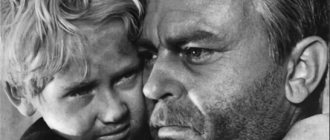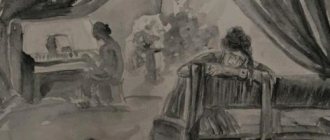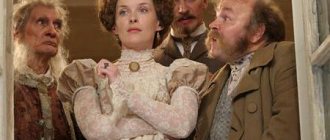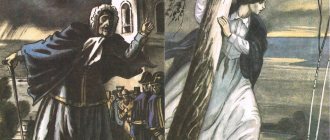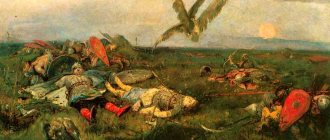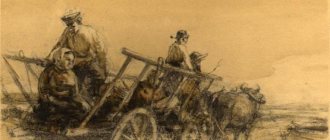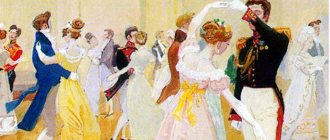History of creation
Sholokhov wrote the story “The Fate of a Man” very quickly, literally in a few days. It was based on the story of a casual acquaintance of Mikhail Alexandrovich. The writer subsequently very much regretted that he did not recognize the name of the person who told him this story.
Perhaps the story of the unknown traveler would never have become a literary work: ten years passed from the moment of the meeting to the writing of “The Fate of Man.”
So, years passed, Sholokhov read Remarque and Hemingway. And the writer was very embarrassed by the enduring image of a person that he could observe in foreign writers - a doomed, weak person. The writer wanted to somehow challenge this judgment - and his answer was “The Fate of Man.”
The story was published and read on the radio. And the response that “The Fate of Man” received from listeners cannot be compared with anything. Sholokhov received hundreds of thousands of letters. People told the writer about their fate - the fate of a person. And although there was no physical opportunity to respond to all these letters, such unprecedented responsiveness of the people made a huge impression on the writer.
Issues:
- man and war;
- fate and homeland;
- moral choice (killing to avoid betrayal; behavior in captivity: not to collude with the enemy, not to betray comrades, to endure all the torments in order to remain human).
The meaning of the title: the title of the story allows us to reach the level of maximum, almost cosmic, generalization. Andrei Sokolov is an ordinary Russian person, and at the same time, a Man with a capital letter.
Literary direction: realism.
Literary genre: story.
Genre features: unfortunately, standard definitions do not allow us to call “The Fate of a Man” an epic story, although such a definition would be perfectly suited for a story that contains a person’s entire life and reveals a panoramic picture of the life of the Russian people. Researchers call “The Fate of Man” a panoramic story.
It is also necessary to pay attention to the fact that Sholokhov uses the composition of a story within a story: the lyrical hero - the author - appears only at the beginning and at the end of the story. The main narration belongs to Andrei Sokolov.
Time and place of action: Andrei Sokolov tells his story to the author in the first post-war spring. Its history itself describes the times of the Great Patriotic War.
How was “The Fate of Man” created?
This year marks the 60th anniversary of one of the best films about the Great Patriotic War.
A gift to the people for the New Year
Today it is difficult to name a publication, a media outlet that would save a serious story for the New Year. And it’s not a fact that readers would be happy with such a gift.
But it is unlikely that the millions of Soviet people who opened the Pravda newspaper on December 31, 1956, were bewildered by the publication of the first part of Sholokhov’s new story “The Fate of a Man,” and the next day—January 1, 1957—by its ending. Maybe the reading itself was postponed until “after the holiday,” but the mere fact that Sholokhov’s new creation appeared was a joyful event for people far from literary studies.
On a tour of Sholokhov’s house-estate, they will tell you how in the spring of 1946, the writer, getting ready to go hunting, met a man and a boy on the banks of the Elanka River. We started talking. the story of a casual acquaintance hooked Sholokhov. Ten years later, Sholokhov wrote his famous story based on it.
Fyodor Shakhmagonov worked as an assistant to Sholokhov at that time. Years later, he recalled that the impetus for his work was Mikhail Alexandrovich’s acquaintance with Hemingway’s story “The Old Man and the Sea,” published in the same 1956 in the magazine “Foreign Literature.” Using the example of the life of a simple Soviet man Andrei Sokolov, who went through the hell of German captivity , lost his entire family in the war, Sholokhov seemed to be giving his answer to the question posed by his overseas colleague about what helps a person endure the most difficult trials, what makes life worth living.
After reading “The Fate of Man,” Sergei Bondarchuk, who had never made a film before, became eager to film this story and play the main role in it. Fedor Shakhmagonov became one of the co-authors of the script.
At first Sholokhov was embarrassed by Bondarchuk’s hands
The artistic council of Mosfilm gave the go-ahead for filming the film “The Fate of a Man” at the very end of 1957.
Was there a risk that the artistic council would doubt the advisability of entrusting the film adaptation of the story of a living classic to a debutant director?
Hardly. Former front-line soldier Sergei Bondarchuk was by that time a famous artist, a Stalin Prize laureate and, moreover, the youngest People's Artist of the USSR! (He received this title at the age of 32, and no one in the entire history of Soviet cinema has broken his age record).
Bondarchuk recalled that his candidacy as the director of “The Fate of Man” did not raise any questions or doubts among Sholokhov himself. But Sholokhov, it seems, did not immediately accept Sergei Bondarchuk as the performer of the role of Andrei Sokolov. According to Bondarchuk, he looked at his hands for a long time and said that Sokolov, who spent half his life behind the wheel, had different hands...
However, when Bondarchuk, already in Sokolov’s clothes, came to Sholokhov again in character, it was such a reincarnation that the writer did not even immediately recognize his recent interlocutor.
Most literary scholars are still inclined to believe that Sholokhov’s image of Andrei Sokolov is still collective, and the pilot Dolnikov, Hero of the Soviet Union, is included among the prototypes. In captivity he called himself... Sokolov! Like Sholokhov’s Sokolov, he drank three glasses of vodka “For Victory!” in the presence of the Germans who decided to laugh at him, and refused the enemy snack. Just like Sokolov, Dolnikov escaped from captivity.
The role of Andrei Sokolov became not only a milestone in the work of Sergei Bondarchuk, but also one of the greatest successes of Soviet cinema in depicting the common man in war.
Without Natalia there would be no Irina
The role of Irina, the wife of Andrei Sokolov, whom he loved dearly, was played in this film adaptation by Zinaida Kiriyenko.
Sholokhov himself chose Kiriyenko for this role. This happened unexpectedly both for herself, and for the director, and, perhaps, for the author of the story himself.
And it turned out that at that moment, representatives of two film crews arrived in Veshenskaya, without agreement. Director Sergei Gerasimov (and with him Kiriyenko) arrived to show the third episode of “Quiet Don”. In this film adaptation, the actress played Natalya, the unloved wife of Grigory Melekhov. And director Bondarchuk, together with his cameraman, looked for locations in the vicinity of the village for the filming of “The Fate of a Man.”
Sholokhov invited them all to visit, and during the feast he asked Bondarchuk if he had found Irina. Bondarchuk replied that he had one actress in mind, but he was not completely confirmed in his decision, since finding a woman who would fit the description of Irina in the story is not easy.
“So why are you looking for something,” said Sholokhov. - Here she sits.
And - pointed to Zinaida Kiriyenko. This turned out to be tantamount to approval for the role by the Mosfilm artistic council. And without testing.
Zinaida Kiriyenko recalled that the scene where Irina breastfeeds her baby for the first time caused great embarrassment for her, the director and the cameraman. Moreover, men have almost more than hers. Soviet cinema in those years was chaste, the naked body appeared in the frame only in some exceptional cases.
The director and cameraman behaved so delicately during this filming that Kiriyenko at some point felt like... Madonna and Child!
And before that scene, when Andrei was leaving for the war and Irina said goodbye to him at the station, did not want to let him go, sensing that she would never see him again, Bondarchuk unexpectedly advised the actress to awaken in herself... Natalya from “Quiet Don”: “Remember how You furiously cursed Gregory, let’s do it to the same extent.”
Pavlik Boriskin was mistaken for a street child
The most poignant episode of this film is the finding of a father by the orphan Vanyushka. When Andrei Sokolov, turning his eternal steering wheel, decides to call himself his father, and Vanyushka throws herself on his neck shouting:
- Dad, dear, I knew that you would find me!
The role of Vanyushka was played by five-year-old Pavlik Boriskin (after his parents’ divorce, his last name changed and he became Polunin).
On the set, Pavlik’s mother was next to him. He played a ragged guy, but one of his most vivid memories of that time was the Mosfilm buffet, where you could buy a sandwich with black caviar and Prague cake for almost nothing. Never later was the work of Pavel Boriskin-Polunin appreciated as highly as on the set of “The Fate of Man.”
The boy’s memory remains of the then resentment towards the director for giving the local boys a beautiful cap given to Pavlik by the props manager, and placing their greasy one on his head. Vanka was running around in rags!
However, the insult was quickly forgotten. In addition, from a trip to Japan, Bondarchuk brought his young actor a wind-up bear.
Pavel said years later that Bondarchuk felt something paternal in his attitude towards him.
There was an interesting episode, not in the movies, but in life, when local women, taking pity on the barefoot Vanyushka, mistook him for a real street child, walked through the courtyards, collected clothes for the boy, and baked pies.
Pavlik Boriskin was predicted to have a great cinematic future, but the role of Vanyushka turned out to be his only success. It took place thanks to the talent of Bondarchuk the director.
The cinematic period ended for Pavlik along with his childhood.
Awards
According to the magazine "Soviet Screen", the film adaptation of "The Fate of Man" became the best film of 1959. It finished fifth at the box office, attracting 39 million viewers.
“The Fate of a Man” received the Grand Prix at the Moscow International Film Festival and won prizes at several festivals abroad.
But, probably, the biggest reward for the filmmakers was the reaction to Sholokhov’s film. Before the all-Union premiere, “The Fate of Man” was taken to Vyoshenskaya. Sholokhov looked and, embarrassed by his emotions, wiped tears from his eyes.
Characters
- Andrey Sokolov is the main character of the story, who tells the story of his life. During the war he was a driver. He was captured by the Germans. I was in captivity for 2 years. His name then was “number 331.”
- Anatoly Sokolov is the son of Andrey. Fought; died from a German bullet on Victory Day.
- Nastya and Olya are the daughters of Andrei Sokolov.
- Vanya is the adopted son of Andrei Sokolov.
- Irina Sokolova is Andrei's wife.
- Ivan Timofeevich is Sokolov’s neighbor.
- Kryzhnev is a traitor.
Summary
The first post-war spring has arrived. The roads were washed away by the thaw. The narrator needed to get to the other side. They promised to send the boat in two hours. At this time, a man with a little boy approached the crossing. The man (it was Andrei Sokolov) and the narrator started talking.
Before the war
While still young, Andrei went to Kuban to work. And at this time there was famine in Voronezh, and all of Andrei’s relatives died.
Returning to Voronezh, Andrei sold his parents' house and married Irina, an orphan. They had a son, Anatoly, and then two daughters, Olya and Nastya. They lived well: Andrei stopped drinking with friends, he kept striving to go home, to his wife and children. Ten years passed like this. And then - war. Sokolov receives a summons, and he goes to the front.
War
The family sees off Andrey. Irina has a bad feeling.
At the front, Andrei becomes a driver and supplies ammunition. After some time, he is captured by the Germans. The prisoners are examined by a doctor. He sets Sokolov's dislocated arm. At night the prisoners are locked in the temple. They are not allowed out to relieve themselves, and those who, for religious reasons, cannot relieve their natural needs in church are shot.
The prisoners are talking among themselves. Sokolov accidentally overhears one man (later it turns out that this is Kryzhnev) threatening to inform the Germans that his comrade is not just a private, but a communist. Andrei Sokolov is filled with hatred of the traitor and kills him.
Captivity
Once in the camp, Andrei Sokolov immediately planned an escape. When he finally fled, police dogs were set in his tracks. The dogs bit Sokolov, and the Germans sent him to a punishment cell for a month.
After serving his sentence, Sokolov was sent to do hard work in a stone quarry. Once Andrei said in his heart that such work is worse than a grave. There was also a traitor in the camp, and he informed the Germans. Sokolov should have been shot.
Mocking him, Herr Müller invited Andrei to drink before his death for the victory of the Germans and have a proper snack (it is clear that the prisoners were constantly hungry and exhausted). Sokolov rejected this proposal. Then Muller invited Andrei to drink to his death. Andrei Sokolov drank, but did not touch the snack. They poured him a second glass. Sokolov drank again, but did not have a snack: he said that even after the second glass he was not used to snacking. The Germans were very amused by this. Sokolov was left alive - and they even gave him a loaf of bread and a piece of lard. He subsequently shared the food with other prisoners.
Escape
1944 Germany is gradually losing ground. Andrei Sokolov is still in captivity.
The Germans learned that Sokolov was the driver. He was made the personal driver of one major. Sokolov began to prepare for escape: he somehow took off the uniform of a drunken German, then hid the weight. And when the non-commissioned officer wanted to go out of town, Sokolov carried out his plan: he stunned the German with a weight, dropped him off, and he changed into German clothes and rushed to the front in a car.
He was greeted joyfully and was even given a month of rest to see his family. Sokolov wrote to his wife. The answer came two weeks later, but not from Irina, but from a neighbor. Terrible news: his wife and both daughters died, their house was destroyed, and in its place there was a pit with rusty water.
Son
Sokolov really missed his wife and daughters. His entire world was made up of his son Anatoly. He and Anatoly began to correspond, and Andrei learned that his son was a division commander. The elder Sokolov imagined how the war would end, and he and Anatoly would live together - Andrey would babysit his grandchildren...
On May 9 the war ended. But the Victory brought Andrei Sokolov not only joy: on May 9, a German sniper killed his son Tolya. The world has collapsed.
Life after the war
Sokolov could not return to Voronezh - he went to visit a friend in Uryupinsk. There he got a job as a driver. He picked up and adopted a five-year-old street child, Vanyushka. The boy fell in love with Andrei very much, and would never agree to stay at home without him, so the two of them went on every flight together.
Recently, however, something bad happened: the car skidded and Andrei hit a cow. The cow was not injured, but Sokolov was deprived of his driver's license. He found a new job in Kashar and is now traveling there with his son. Everything would be fine, but my heart is naughty and tormented by memories of my wife, daughters, and son.
The boat arrived, and Andrei Sokolov said goodbye. Vanyushka also waved goodbye to the lyrical hero.
Other characters in “The Fate of Man” by M.A. Sholokhov
We learn about the remaining characters from the memories of the main character.
He speaks warmly about his family: his wife Irina and children - Anatoly, Nastenka and Olyushka.
In the episodes there are heroes whom the narrator sympathizes with - a military doctor who helped Russian soldiers in captivity, a company commander saved by Sokolov from an informer, and a Uryupinsk friend who sheltered the hero at home after the war.
There are also negative characters: the traitor Kryzhnev, the camp commissioner Müller, the German major engineer.
The only character we see in the hero's present is his adopted son Vanyusha, a little boy who firmly believes that Sokolov is his real father.
